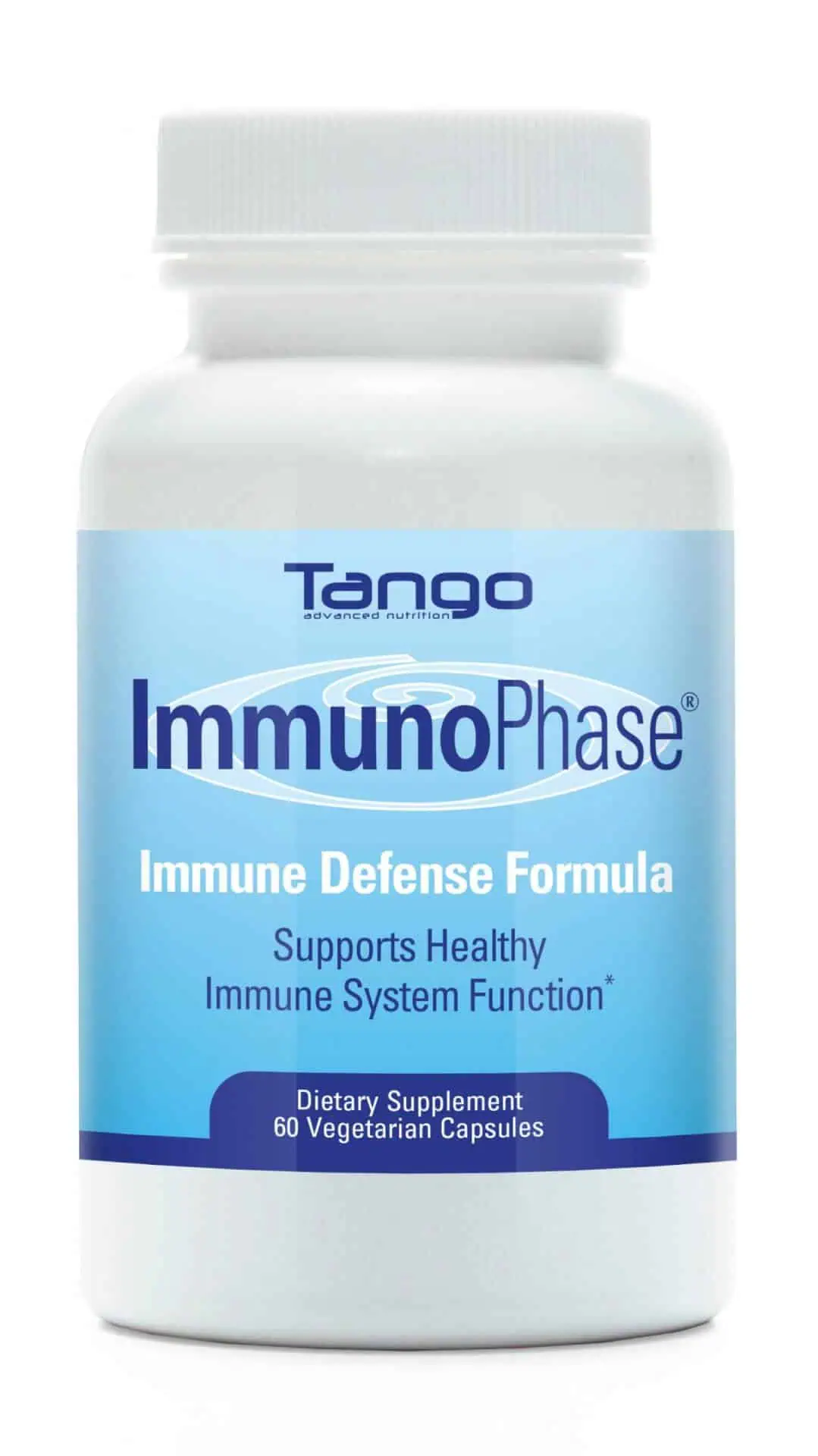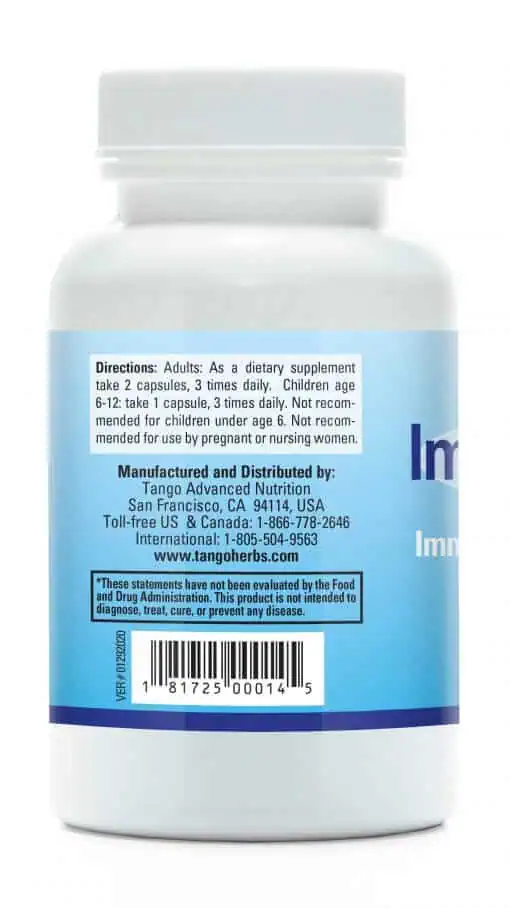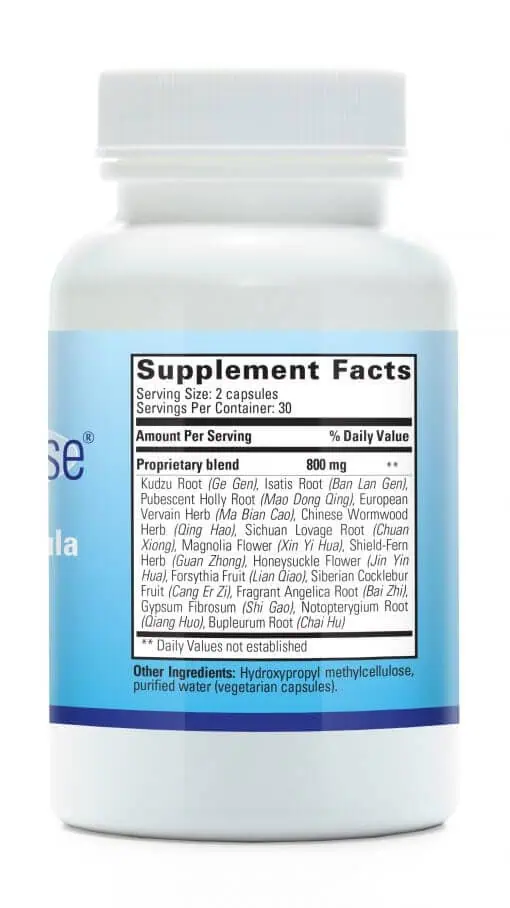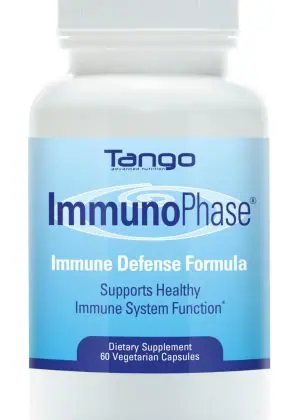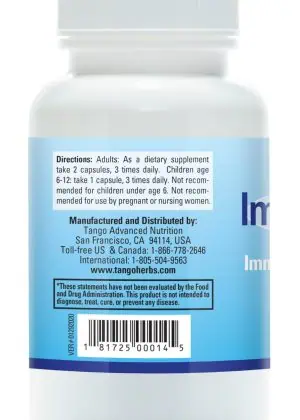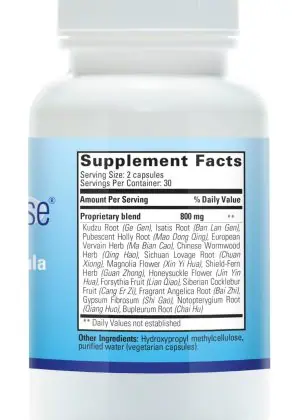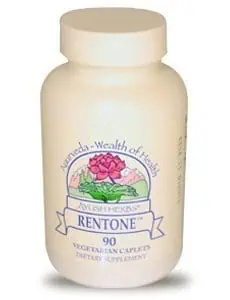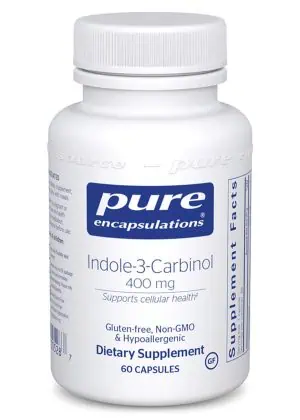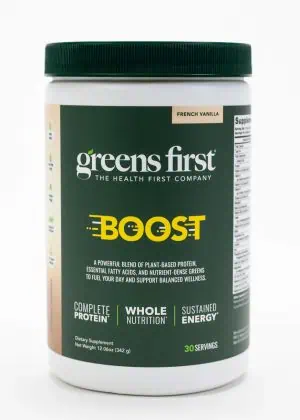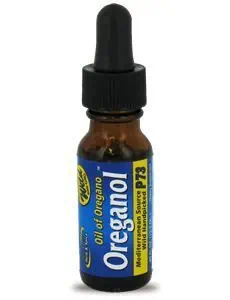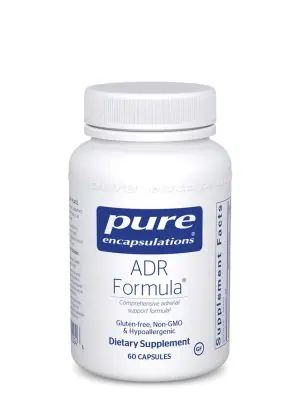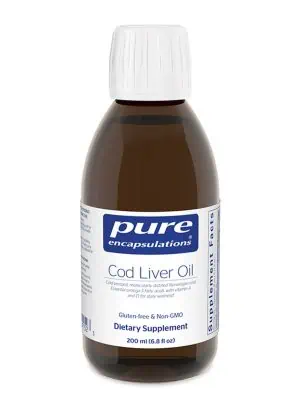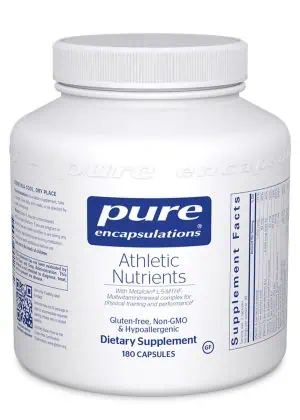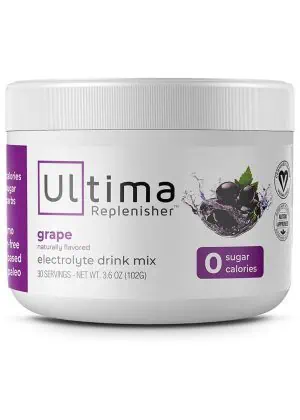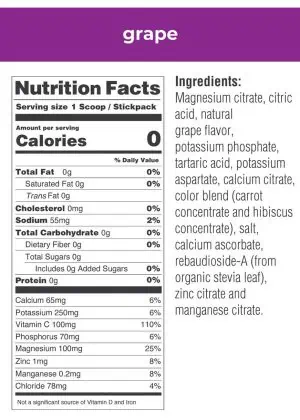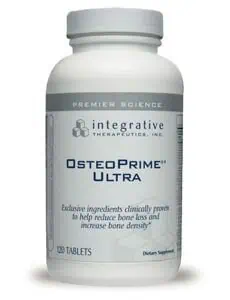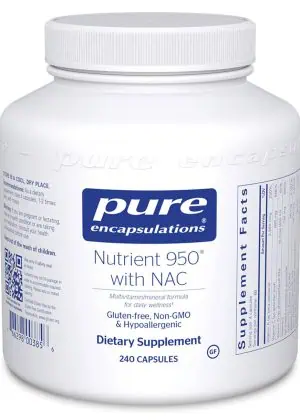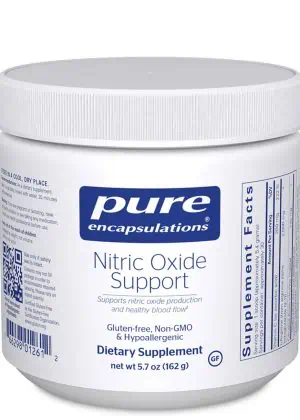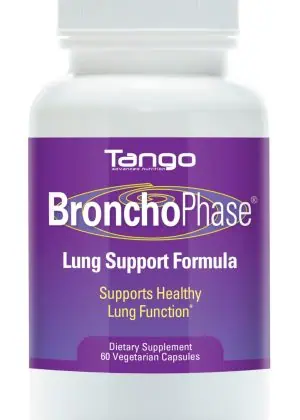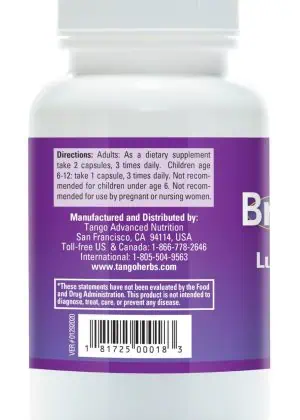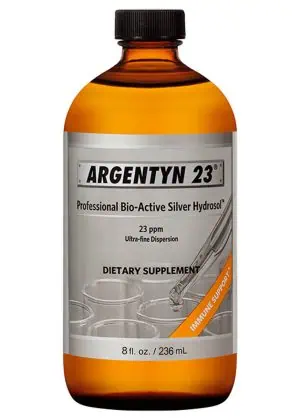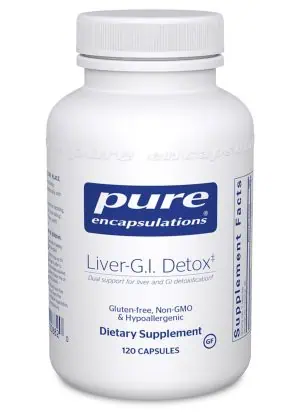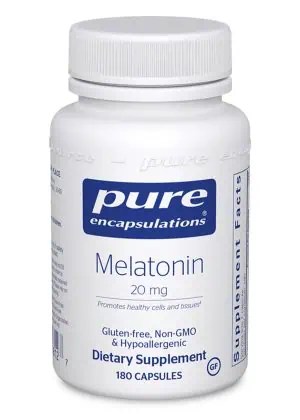Immuno Phase
Suggested Use: Adults: Take two capsules every 2-3 hours. Children age 6-12: Take one capsule every 3 hours. Note: ImmunoPhase is not recommend for children younger than age six due to the fact that their immune systems are different from those of older children and adults.
In 1990, medical and herbal researcher Dr. Dexin Yan launched an intensive study of the effects of three traditional seasonal formulas – Yin Chiao, Gan Mao Ling and Zhong Gan Ling – used to support upper respiratory health. Dr. Yan began by combining the best elements of these three formulas. Next, he increased the amount of three important herbs – Ilex, Isatis, and Forsythia – which research has shown exert immune-supporting actions. Dr. Yan then added elements from a fourth formula, Pe Min Kan Wan, traditionally used to support healthy sinuses.
After extensive testing and clinical evaluation Dr. Yan finally arrived at a single formula that maintains a healthy immune system. Best of all, reports from his patients revealed that the formula was especially effective at addressing sinus and congestion issues.
Dr. Yan’s final ImmunoPhase formula contains time-proven herbs and botanicals, including:
- Isatis (Radix Isatidis seu Baphicacanthi) Isatis root, a time-proven botanical component in traditional Chinese medicine, may support immunological function and overall immunity in laboratory research animals. (1)
- Ilex (Radix Ilicis Pubescentis) Ilex root has been shown in research to modulate inflammatory and analgesic characteristics in vivo. (2)
- Artemesia (Herba Artemesiae Apiacae) Artemisia, an herb traditionally used in Korean herbal medicine to clear damp heat, has been shown to down-regulate inflammatory mediators, suggesting it may be beneficial for inflammatory conditions. (3)
- Red Magnolia (Flos Magnoliae Liliflorae) Flos Magnoliae (FM, Chinese name: Xin-yi) is one of the most commonly used Chinese medicinal herbs. It has a long history of clinical use for maintaining healthy sinuses. Certain bioactive compounds in red magnolia flower make it a potential source for developing new inflammatory-modulating products. (4)
- Honeysuckle (Flos Lonicerae Japonicae) Lonicera japonica Thunb.(Caprifoliaceae) has long been known to regulate inflammation. One study suggests that an aqueous extract of this flower may act as a therapeutic agent for inflammatory issues through selective regulation of NF-kappaB activation. (5)
- Forsythia (Fructus Forsythiae Suspensae) Oleaceae Forsythiae Fructus has been used for inflammation modulation and immune support in traditional herbal medicine. Research demonstrates that a bioactive agent of Forsythiae Fructus may possess significant inflammatory modulating action by inhibition of the exudation, and leukocytes recruitment into the inflamed tissues. (6)
- Angelica dahurica (Radix Angelica Dahuricae) More than 60 species of medicinal plants belong to the genus Angelica (Family: Apiaceae). Many of these species have long been used in ancient traditional medicine systems. Active compounds in this plant compare favourably with some of the newest immune-supporting agents. (7)
- Bupleurum (Radix Bupleuri) Radix Bupleuri is widely used in traditional medicine for the treatment of seasonal health issues. Study results suggest that essential oils from Radix Bupleuri can be potentially effective as immune supporting compounds. (8)References 1. Zhao YL, Wang JB, Shan LM, Jin C, Ma L, Xiao XH. Effect of Radix isatidis polysaccharides on immunological function and expression of immune related cytokines in mice, Chin J Integr Med. 2008 Sep Pubmed ID: 18853118 2. Wang JR, Zhou H, Jiang ZH, Wong YF, Liu L. In vivo activities of a purified saponin fraction derived from the root of Ilex pubescens, Biol Pharm Bull. 2008 Apr. Pubmed ID: 18379056 3. Lee HG, Kim H, Oh WK, Yu KA, Choe YK, Ahn JS, Kim DS, Kim SH, Dinarello CA, Kim K, Yoon DY. Tetramethoxy hydroxyflavone p7F downregulates inflammatory mediators via the inhibition of nuclear factor kappaB, Ann N Y Acad Sci. 2004 Dec Pubmed ID: 15659838 4. Shen Y, Li CG, Zhou SF, Pang EC, Story DF, Xue CC. Chemistry and bioactivity of Flos Magnoliae, a Chinese herb, Curr Med Chem 2008 Pubmed ID: 18673228 4. Shen Y, Li CG, Zhou SF, Pang EC, Story DF, Xue CC. Chemistry and bioactivity of Flos Magnoliae, a Chinese herb for rhinitis and sinusitis, Curr Med Chem 2008 Pubmed ID: 18673228 5. Lee JH, Ko WS, Kim YH, Kang HS, Kim HD, Choi BT. Inflammatory-modulating effect of the aqueous extract from Lonicera japonica flower is related to inhibition of NF-kappaB activation through reducing I-kappaBalpha degradation in rat liver, Int J Mol Med. 2001 Jan Pubmed ID: 11115613 6. Kang HS, Lee JY, Kim CJ. Inflammatory-modulating activity of arctigenin from Forsythiae Fructus, J Ethnopharmacol. 2008 Mar 5;116(2):305-12. Epub 2007 Nov 26. Pubmed ID: 18180122 7. Lechner D, Stavri M, Oluwatuyi M, Pereda-Miranda R, Gibbons S. Activity of Angelica dahurica (Bai Zhi), Phytochemistry, 2004 Feb Pubmed ID: 14751304 8. Xie Y, Lu W, Cao S, Jiang X, Yin M, Tang W., Preparation of bupleurum nasal spray and evaluation on its safety and efficacy, Chem Pharm Bull (Tokyo). 2006 Jan Pubmed ID: 16394548 * These statements have not been evaluated by the Food and Drug Administration. This product is not intended to diagnose, treat, cure, or prevent any disease.
Product Ingredients
| Ingredients | AMT | %DV |
|---|---|---|
| Proprietary Blend | 800mg | - |
| Pueraria root (Radix Pueraria Lobetae) | - | - |
| Isatis root (Radix Isatidis seu Baphicacanthi) | - | - |
| Ilex root (Radix Ilicis Pubescentis) | - | - |
| Verbenae herb (Herba Verbenae) | - | - |
| Artemesia herb (Herba Artemesiae Apiacae) | - | - |
| Ligusticum root (Radix Ligustici Wallichii) | - | - |
| Red Magnolia flower (Flos Magnoliae Liliflorae) | - | - |
| Shield-Fern herb (Rhizoma Blechni) | - | - |
| Honeysuckle flower (Flos Lonicerae Japonicae) | - | - |
| Forsythia fruit (Fructus Forsythiae Suspensae) | - | - |
| Xanthii fruit (Fructus Xanthii) | - | - |
| Angelica dahurica root (Radix Angelica Dahuricae) | - | - |
| Gypsum fibrosum (Gypsum Fibrosum) | - | - |
| Notopterygii root (Rhizoma et Radix Notopterygii) | - | - |
| Bupleurum root (Radix Bupleuri) | - | - |
Why Buy From Us?As a trusted family- and employee-owned company for over 25 years, we've shipped more than 1 million packages, empowering our customers with expert knowledge, guiding their wellness journeys, while delivering unparalleled customer service.

Welcome to Pure Prescriptions
I founded Pure Prescriptions after overcoming Cancer at age 29, a battle that taught me the power of natural supplements and inspired me to make professional-grade, doctor-only brands accessible online—pioneering the industry over 25 years ago.
Today, still a family- and employee-owned company, we've shipped over 1 million packages, empowering countless wellness journeys with science-backed, U.S.-manufactured vitamins and supplements meticulously curated for superior quality and optimal results. Our real health experts provide personalized recommendations without upsells or gimmicks—just genuine support tailored to your needs.
Not a customer yet? We'd be thrilled to earn your trust and guide you toward vibrant health.
Sincerely,
Helpful Links:
Contact Us | LIVE Chat | Vitamin Quiz
The Pure Prescriptions Difference
When you choose Pure Prescriptions, you become part of our caring community. We’re committed to enhancing your wellness with personalized service, expertly selected products, and a dedication to your health & happiness.


Related products
Get Notified When Back In Stock
Verify you are Human:
-
- Vitamin Quiz
- Deals
- Shop
- Brands
- Shop by Manufacturer Brand
- Shop by Manufacturer Brand
- About
- Login
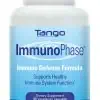
In stock





